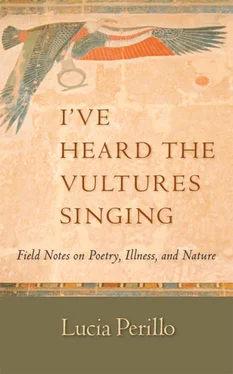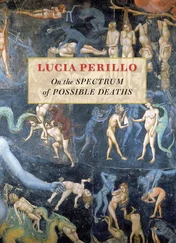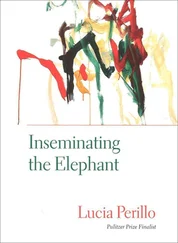We don’t need binoculars to tell the difference between the three different types of wren, and I don’t need the tape or a sonogram to tell me the difference between their songs because I can see perfectly well which birds are singing as they stand in the open with their heads tipped back and their beaks open. I imagine that the holy man’s happiness doesn’t hinge on this kind of attainment. He doesn’t hanker after any infrastructure like this trail to take him anywhere other than where he already is, and he doesn’t let fretting after knowledge interfere with his listening and the music’s nameless seeping-in, as he sits in his spot in the Himalayas where the soil is too thin to allow for burial and the human dead are chopped up and left for the birds to eat.
To close that last paragraph, I was going to write “and then our bodies become the song,” but this phrase, though melodic-sounding, is incorrect, I realized. The birds that take part in the “sky funeral” are vultures, birds that portion off the dead. And I can find no entry for vulture on the definitive tape, no song or call or chatter or whinny or drum. These graveyard-workers, the tidy-uppers of mortality, remain resolutely mute.
A tree falls in the forest without me to hear. This is an old riddle, almost a cliché.
Never mind whether or not it makes a sound, what I worry about from time to time these days is whether or not I care or, rather, about what form the caring should take now that the forest has spurned me, now that I can’t enter it. Whether or not I’m bitter about that tree, the loss of the opportunity to hear its crack and crash.
Sometimes I do venture down a logging road, jiggling along. This sensation — motionless motion, uncomfortable under the ass and thighs — makes me realize that it wasn’t so much the wilderness I loved as much as the feeling of my body moving through it, a feeling I loved best when my body hiked in solitude. The freedom of not having a companion whose speed I’d have to adjust myself to, whose pace would tell me, without words, whether I was fast or I was slow. Whether I’d succeeded in becoming what I’d hoped to be (a lone body conquering the wilderness — was that it? a body that transcended its gender?) or whether I had failed.
Solitude offers no gauge and no judgment. For the equanimity of solitude, I’d be willing to spend a day or week, whereabouts unknown, injured and waiting for rescue (my wilderness days preceded the invention of cell phones, and I’m glad about that; to have had such easy access to rescue would have shrunk the experience).
It used to pain me to live in sight of the mountains, as though I were living in a small town where I kept running into an ex-spouse at the grocery store, an ex-spouse who looked healthier than me and had already picked up a young lover, although after twenty years I think my rage/annoyance/grief has finally passed. In its wake, I waste time worrying about whether it’s possible to tell the difference between “pure” memory — memory without sentiment — and nostalgia, a word derived from the Greek root for home and Latin root for sickness . Of course I am homesick for my former days. And yet we frown on nostalgia for smearing the past with a syrupy glaze. What is needed is another term that would allow us to long for the past with the accuracy of un-smudged recollection.
Or perhaps accuracy is incompatible with our reconstructions of the past, and our longing derives from their individuality, from the tilt we have given them. But don’t some remembrances hold out the possibility of objective “truth”? Like the smell of the twenty bodies in the climbing shack, that male funk of sleep, and the groans like sobs that came with it? Or how I used my brassiere to wrap my friend’s ankle when he twisted it at the top of Mount Rainier? Or the sound snow makes when stepped on at the summit, a crunch like the sound of burnt toast being bitten. Plus the sensation of the crystals underfoot, compacting into the waffle boot-print, grinding against each other as they settle?
No, not the bra — that was a different mountain. The rest I’m pretty sure I’ve got right though.
Now here I am. Back where my adulthood job-life started — at a national wildlife refuge. I chose this place for my destination because it’s close enough to the interstate that my cell phone works, should the apparatus of my solitude break down (funny how I’ve come to welcome the idea of rescue). I wonder if people are happy to be paying for the upkeep of this kind of place, I mean a wildlife refuge kind of place, which is often not so picturesque and remains empty of human traffic; in fact, its purpose is better served without the human element.
Because the refuge lies only five miles from town, it does not have the desolate quality that many refuges have. It’s mostly inaccessible meadowland, meant to be looked at through binoculars; no trails run though the center of it, so the animals can be left undisturbed. This flatland used to comprise a farm that stayed in business for sixty years until competition shut it down. Because of its location in the delta, the farm was not a viable business until a levee was built around it. Now people use the levee for a walking path, though boardwalks have already been built in preparation for the day when the levees will be broken so the meadow can revert to saltwater marsh. Then the mouth of the river will open wide again.
Levees and boardwalk: it’s the kind of non-topography that’s rare in the craggy Northwest. A place suitable for women pushing expensive baby-strollers that look like rickshaws. Its tameness offends me, though it’s the kind of rollable wilderness where I can still be alone.
In his treatise about the two years he spent at Walden Pond, Thoreau wrote, “There can be no very black melancholy to him who lives in the midst of nature and has his sense still.” No comment on what happens when sense abandons us; it’s through bodily and mental health and strength, according to Thoreau, that we “come to know that we are never alone.” Builder of cabins, sower of beans, Thoreau’s body is the primary instrument he used in his experiment with living in relative isolation in nature. Walden is, at rock-bottom, the chronicle of Thoreau’s body’s trajectory through the woods.
When the legs become unreliable, one loses a large portion of the world. I get tired of the word accessible , the idea that the world must be reworked for my benefit. Instead, I start dreaming up machines that could take me anywhere; this technology seems easy when compared to, say, designing a little car that can be steered from 50 million miles across the solar system, over the terrain of Mars. A low-tech solution is for me to substitute companionship for solo travel, preferably the kind of companionship that won’t impinge on solitude — which shouldn’t be too hard since solitude is not a matter of being, in the strictest sense, alone. “The great man is he who in the midst of the crowd keeps with the independence of solitude,” said Emerson, and The Book of Famous Quotes contains plenty of this sort of advice, about how solitude should be a psychic space.
But the business of solitude has become troublesome for me of late. It seems natural for friends to draw away from my physical unseemliness as my body decays, and the plain fact is: I can’t enter their homes anymore. Since I was never a social creature, this encroaching solitude might suit me, save for the fact that I haven’t elected it, and the loss of choice in the matter grates against me. Of necessity, I’ve also begun to spend time in the company of people whom I pay to help me with the logistics of my living, and so solitude has become elusive at the same time as it’s become oppressive, caught as I am in the push-pull of wanting more of it and yet resenting my involuntary isolation.
Читать дальше











![Various - Birds and Nature, Vol. 12 No. 5 [December 1902]](/books/745517/various-birds-and-nature-vol-12-no-5-december-thumb.webp)
![Various - Birds and Nature Vol. 11 No. 2 [February 1902]](/books/745533/various-birds-and-nature-vol-11-no-2-february-1-thumb.webp)